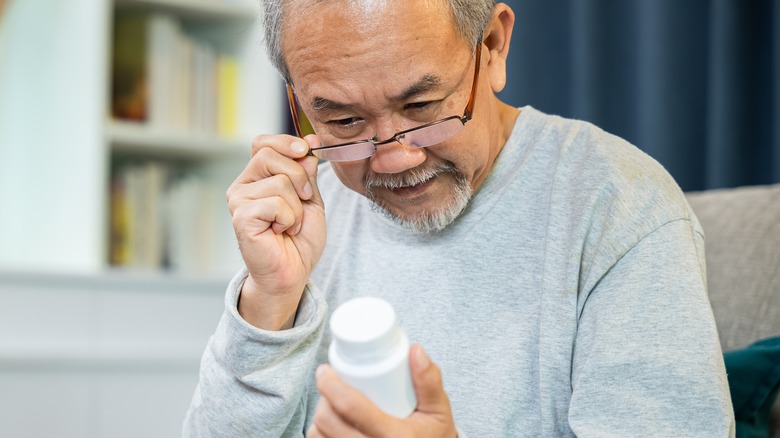Is There A Danger In Mixing Alcohol And Corticosteroids?
Corticosteroids are versatile drugs used to help treat numerous health conditions across many different medical disciplines. In addition to their immunosuppressive properties, corticosteroids have the ability to relieve inflammation, as well as restore the balance of hormones within the body (via Medical News Today).
As a result, these drugs may be prescribed to patients with allergies, asthma, hives, psoriasis, COPD, lupus, rheumatoid arthritis, and much more. Not only that, but according to Corticosteroids, these drugs may also be of use in treating cases of leukemia, lymphoma, insufficient adrenal production, contact dermatitis, as well as certain eye conditions.
Because corticosteroid medications can come with both short-term and long-term side effects, you'll want to take them exactly as prescribed by your doctor. Therefore, if you're someone who enjoys a drink every now and again, it's important to know whether there are any warnings or potential side effects associated with alcohol use while taking corticosteroids.
How alcohol may affect the body while taking corticosteroids
Not all corticosteroids are the same. Therefore, our bodies may react to different corticosteroids in different ways. For example, oral corticosteroid medications may have a greater impact on the body than topical creams or nasal spray products (via GoodRx Health). Prednisone, methylprednisolone, hydrocortisone, and dexamethasone are among some of the more frequently prescribed oral corticosteroid medications.
While there are no reported interactions between oral corticosteroids and alcohol, drinking alcohol may exacerbate the condition that the medications are working hard to treat. In addition, remember that corticosteroids have immunosuppressive properties. Combine that with the immune-suppressing effects of alcohol, and you're diminishing your body's ability to fight off illness. High amounts of alcohol consumption can also pave the way for bacteria to make its way from the stomach into the bloodstream more easily, thereby increasing the risk for infection.
Something else to consider is that corticosteroid medications already come with potential side effects on their own. Drinking alcohol while taking these drugs may amplify these side effects, which can include headache, weight gain, heartburn, abdominal discomfort, and changes in mood. Even more, it may also increase someone's risk for type 2 diabetes, pancreatitis, dehydration, and gastrointestinal damage, amongst other conditions (via Drugs.com).
Ask your doctor for guidance
Severe side effects resulting from combined usage of alcohol and corticosteroids are considered highly unlikely, but can occur. These potentially include decreases in mineral bone density and an increased risk of stomach bleeding, according to GoodRx Health. Should you notice symptoms such as stool that is black in color or the presence of blood in your vomit or stool, be sure to seek prompt medical care. The same is true if you develop severe side effects related specifically to corticosteroid use, such as irregular heart rate or breathing, high blood sugar levels, significant mood changes, or difficulty thinking or talking.
If you have questions regarding alcohol consumption while taking corticosteroids, be sure to speak to your physician. Although drinking while using corticosteroids is generally not advised, your doctor can give more personalized guidance depending on the amount of medication being taken, duration of treatment, and your individual alcohol use. While a drink here or there may be approved by a doctor if the patient is taking a lower dosage, it may not be recommended for a patient taking a higher dose of medication for a prolonged period of time (via Drugs.com). If you are using corticosteroids for short-term treatment, ask your doctor when it is safe to resume drinking alcohol, as some medications may require a longer waiting period as your body adjusts to being without the medication.



